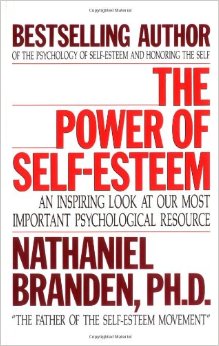
The Power of Self-Esteem
BY NATHANIEL BRANDEN, Ph.D (PUBLISHED 1992 BY HEALTH COMMUNICATIONS, INC. 97 pages)
Nathaniel Branden, called “the father of the self-esteem movement,” was one of the best-known psychotherapists in the United States and wrote extensively on the subject. He was also known in the freethought community for his openly-stated atheistic views. When I questioned him about this, Branden told me that, while he does not campaign for atheism per se, he was a complete and unapologetic opponent not only of religion, but of all forms of magical thinking. Perhaps this explains why the word “atheism” appears nowhere on these pages. Nonetheless, even the most casual perusal will reveal that the entire foundation of Brandon’s psychology rests on a hostility toward religious belief and so-called religious “truth.” Christianity in particular, with its emphasis on sin, guilt, self-sacrifice as a moral ideal, and especially its notion that learning itself is intrinsically evil must, by implication be the very antithesis of a healthy self-esteem.
Branden (1930-2014) tells us that authentic self-esteem pertains to the understanding of our fundamental competence and value as individuals. One does not attain it by rote recital of catch-all phrases or by identifying one’s worth in terms of a specific group or organization. For while groups can provide a temporary shelter for a fragile ego, they can also serve as a source of self-delusion.
One indication of a person’s sense of self-worth can be seen in his or her openness to criticism and willingness to acknowledge mistakes, and to change their opinions accordingly. This is because, unlike religion, authentic self-esteem is not correlated to a false image of “perfection.” Here we can see how the concept of an all-good, all-knowing deity serves to lower self-esteem. Religious people delight in telling us what we are made in “his” image, but how short we are said to fall in comparison to this ideal! At this point, the concept of sin is introduced. Depending on the degree two which these nonsensical doctrines are accepted, one’s perceived value as an individual sinks proportionally.
It is not a coincidence that the church teaches people to beware of the “sin” of pride. Pride in one’s accomplishments, indeed, in one’s worth as a member of the human community, is an essential component of healthy self-esteem. People of a good healthy view of themselves do not constitute the majority population of our prisons.
We as a species continue to evolve, not only physically, but sociologically as well. One of the great failings of religion is that it instills a false sense of security in conjunction with the feeling that if we could somehow return to those pristine biblical days and submit our wills to god (which means the priestly class), all will turn out well for us in the end.
However, this is contrary to human nature. We cannot hope to regress sociologically any more than we can hope to regain our tails. To demand that we do so and return to the ethical standards of our distant ancestors strikes me as a sign of gross naivete bordering on insanity. It also demonstrates an appalling ignorance of the human animal’s capacity and need for growth.
The Power of Self-Esteem serves both as an introduction to the subject matter and also to the larger body of the author’s writings. While there are no direct attacks on religion, the overall tone of the book serves to demonstrate its potential harm on the psychological makeup of the individual.
Categories: Book Reviews
